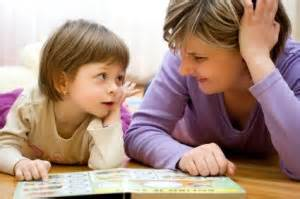Website Redesign Coming December 1-5!

Letters and their sounds
Phonological awareness (rhyming; breaking down words into sounds)
Narrative skills and comprehension
Background knowledge (learning about the world around them)
Vocabulary
Print awareness (the way a book is organized; learning that print has meaning; loving books)
In other words, reading aloud can teach children all the oral language components they need to know in order to become successful readers. But perhaps the most important thing reading out loud can teach children is a love of reading. If the reading aloud experience is fun and pleasurable, a child will want to learn to read and will work hard to learn, even if it is sometimes a struggle. So...

For example:
If children are actively involved in the reading aloud experience, they learn more early literacy skills - and it's more fun!
Talk, talk, talk - about the story and the pictures. Encourage your child to participate with repeated phrases, animal sounds, and so on. Ask your child what is happening in the pictures or to predict what will happen next. If something in the story or the pictures prompts a memory in your child's life, talk about it! Have a conversation around the book and always keep it fun!
Here are three great ways to read aloud with a child: